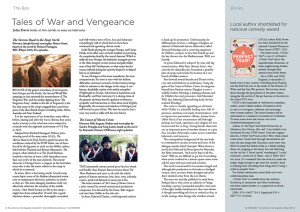John Davis looks at two novels as seen on television

The Narrow Road to the Deep North
Director: Joseph Kurzel; screenplay: Shaun Grant; based on the novel by Richard Flanagan;
BBC IPlayer 2025; five episodes.
Because of the greater immediacy of news reports from Europe and the Pacific, the Second World War campaign in Asia assumed the nomenclature of ‘The Forgotten War’ and the soldiers fighting there ‘The Forgotten Army’. Added to this list of ‘forgottens’ is the fact that many of the troops engaged there came from parts of the then British Empire including India, Africa, Australia and New Zealand.
It is the experiences of an Australian army officer, before, during and after the war in Burma that come under scrutiny in this television series released to coincide with the eightieth anniversary of V-J Day in 2025.
Adapted from Richard Flanagan’s Pulitzer prize-winning novel of the same name (2013), The Narrow Road to the Deep North is partly based on the conditions endured by his POW father, one of those forced by the Japanese to work on the 480km railway link between Thailand and Burma (Myanmar). The project, often referred to as The Death Railway, resulted in the loss of some 2,800 Australians more than one in five of the men enslaved. The central character is Dorrigo Evans, a surgeon in the Australian army who is also the senior officer in the camp in which he is interned.
At times, this is a harrowing watch. Several camp scenes depict some of the bleakest dramatized events seen on mainstream television, authentic no doubt as they are. The inter-changing timelines work very effectively otherwise the intensity of the middle section—that which focuses on life in the camp—might have been unbearable. Overall, this is good television drama, a powerful, thoroughly researched and well-written story of love, loss and endurance compellingly told in which horrors have been witnessed and agonising choices made.
Jacob Elordi, playing the younger Dorrigo, and Ciaran Hinds, in his older years, are both excellent in portraying the complexities faced by the central character. Which is really the true Dorrigo, the hedonistic youngster pre-war or the often arrogant yet also morose and guilt-ridden man of later life? Furthermore, to what extent has the trauma suffered during his captivity shaped or re-shaped him as an individual?
To me, Dorrigo is at his most considerate, his most compassionate, his most in tune with the frailties, difficulties and inner torments of other human beings while he minsters to his charges in the camp. Is not history, thankfully, replete with similar examples? (Nightingale in Scutari, Schweitzer at Lamberene and Bonhoeffer and Nazi Germany.) It is during times of the greatest adversity that the qualities of tolerance, sympathy and humaneness so often shine most brightly. Regrettably, the traumas and mistakes of Dorrigo’s past will forever be part of him. War hero he may be, but a man very much at odds with his own history.
The Count of Monte Cristo
Director: Bille August; Outline and screenplay by Sandro Petraglia and Greg Latter; based on the novel by Alexandre Dumas; U&Drama; eight episodes.
This nineteenth century period piece has less ‘swash and buckle’ than Dumas’ famous stories about The Three Musketeers and more to do with the whole gamut of human emotions, love, hate, envy, jealously, avarice, pride and betrayal to name just a few.
The latest iteration of The Count of Monte Cristo is a joint venture by several international production companies. It is directed by the Dane, Bille August, and stars Sam Claflin in the title role.
In short, Edmond Dantes, a well-respected seafarer is lined up for promotion. Unfortunately, for differing base motives, a colleague, Danglars, an admirer of Edmond’s fiancée (Mercedes) called Fernand Mondego and a conniving magistrate de Villefort, conspire to have him locked up and the key thrown into the Mediterranean. Well, not literally.
In prison Edmond is ‘adopted’ by wise, old ‘lag’ turned mentor, Abbe Faria (Jeremy Irons), who unravels the dastardly plot, formulates a possible plan of escape and reveals the location of a vast hoard of hidden treasure.
Fast forward several decades and Dantes is free, very rich and hell-bent on retribution. Using the guise of the Count of Monte Cristo, he integrates himself into Parisian society. Danglars is now a wealthy banker, Mondego a leading politician and de Villefort the royal prosecutor. And Mercedes? Well, alas, believing Edmond long dead, she has married Mondego.
The series is visually appealing on all fronts while Claflin is a plausible leading man, full of patience, aloofness and steely determination, with no lapses into pantomime villainy. Jeremy Irons (Abbe Faria) is his consummate self although perhaps too lucid, optimistic and chipper for one incarcerated for so long. Strong female characters are an important part of modern dramas so a pity Ana Girardot (Mercedes) comes across somewhat lukewarm and insincere.
The cosmopolitan background of the cast leads to a mismatch in accents at times and some of the dialogue sounds stilted. Example: When shown a watch that Edmond had been given by Mercedes, the Abbe comments, “And you’ve kept it all this time?” Well yes, it’s difficult to get rid of something when you’re confined in a sixteen square metre stone cell for years with just a bed and a bucket.
The novel is renowned for its excessive length and, although this production is obviously an abridged version, there are times when divergent sub-plots draw attention away from the core theme.
The story was initially published in serial form. Perhaps that is why, never an adherent of ‘binge watching’ anyway, I persuaded myself to view each of the eight weekly instalments as they were shown. A thought-provoking tale then to remind us that, as in life, revenge often brings only a hollow reward.



